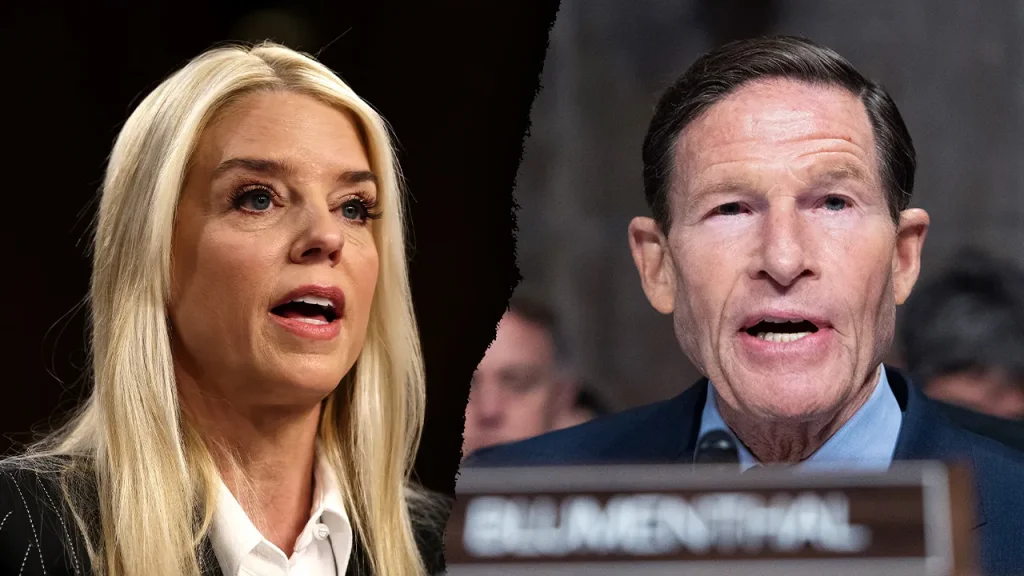Tensions Flare Between Attorney General Bondi and Senator Blumenthal During Senate Hearing
In a dramatic moment that captured attention at a recent Senate Judiciary Committee oversight hearing, U.S. Attorney General Pam Bondi and Senator Richard Blumenthal (D-Conn.) engaged in a heated exchange that quickly deviated from policy matters to personal accusations. What began as questioning about potential conflicts of interest related to Bondi’s former law firm erupted into a confrontation about past statements and personal integrity. The incident highlighted the increasingly tense atmosphere that characterizes many congressional hearings in today’s polarized political landscape, where oversight sessions can quickly transform into battlegrounds of personal attacks rather than substantive policy discussions.
The confrontation ignited when Senator Blumenthal questioned Bondi about her previous employment at Ballard Partners and a specific merger involving American Express Global Business Travel. Blumenthal’s inquiry centered on whether Brian Ballard, described as “a longtime backer and head of the law firm” where Bondi had worked, had lobbied the Justice Department to abandon a lawsuit related to the merger. The question appeared designed to explore potential conflicts of interest or improper influence that might affect Bondi’s role as Attorney General, touching on the recurring theme of the “revolving door” between government service and private sector influence that frequently arises in Washington politics. However, rather than addressing the substance of the question about potential communications with her former employer, Bondi chose to redirect the exchange in a remarkably personal direction.
Bondi’s response was swift and confrontational, immediately pivoting away from the question about her former law firm to attack Blumenthal’s character. “Sen. Blumenthal, I cannot believe that you would accuse me of impropriety when you lied about your military service,” she declared, referencing controversies from Blumenthal’s past that had been widely reported during his political career. “You lied — you admitted you lied to be elected a U.S. senator,” she continued, speaking over the senator and adding with evident emotion, “How dare you? I’m a career prosecutor. Don’t you ever challenge my integrity.” Her forceful retort effectively derailed the original line of questioning about potential conflicts of interest, shifting the focus to a personal dispute that overshadowed the oversight hearing’s intended purpose of examining Department of Justice operations and policies.
The controversy Bondi referenced dates back to Blumenthal’s 2010 Senate campaign, when reports emerged that he had on several occasions made statements suggesting he had served “in Vietnam” when in fact he had served in the U.S. Marine Corps Reserve during the Vietnam era but was not deployed to the conflict zone. When these discrepancies came to light during his campaign, Blumenthal acknowledged that he had “misspoken” in some instances, describing those remarks as “absolutely unintentional” errors that occurred only a few times among “hundreds” of speeches he had delivered throughout his career. While accepting responsibility for these mischaracterizations, Blumenthal has maintained that he remains proud of his military service, stating: “Unlike many of my peers, I chose to join the military and serve my country,” and asserting that he would not allow “a few misplaced words” to diminish his service record.
The exchange exemplifies a troubling trend in congressional oversight hearings, where substantive policy questions are increasingly met with deflection, counterattacks, or attempts to impugn the questioner rather than addressing the underlying issues. In this case, the original inquiry about potential conflicts of interest—a legitimate area for congressional oversight of a cabinet official—went unanswered as the discussion devolved into personal recriminations. This pattern reflects the broader deterioration of civic discourse in American politics, where accountability mechanisms like congressional hearings can be rendered ineffective when officials choose to attack the credibility of questioners rather than respond to the substance of their inquiries. The incident also illustrates how past controversies can resurface in unexpected contexts, becoming weapons in unrelated political confrontations.
Beyond the personal dimensions of this clash, the exchange between Bondi and Blumenthal represents a missed opportunity for transparency regarding important questions about the relationship between government officials and their former private sector employers. The public interest in understanding whether former lobbying connections might influence decision-making at the highest levels of the Justice Department was ultimately subordinated to a personal dispute that generated headlines but shed little light on the oversight committee’s core concerns. As political tensions continue to intensify in Washington, the challenge of maintaining focus on substantive policy issues rather than personal attacks remains a significant obstacle to effective governance and accountability, leaving important questions unanswered while attention shifts to the spectacle of interpersonal conflict rather than the substance of public policy.











